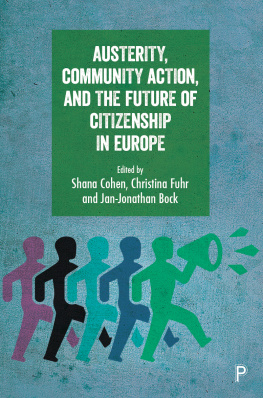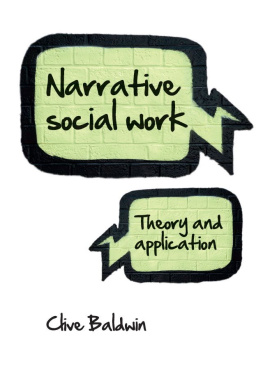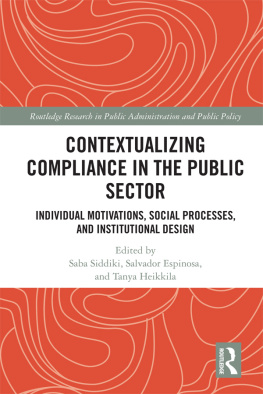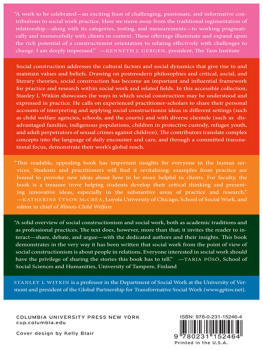Transforming Social Action into Social Change
Cohen offers a new framework for analyzing social projects and local social activism. Rather than look at how single projects are designed and managed to evaluate their impact, the approach calls for analyzing fields of social action: policy and politics, institutional behavior, social networks among policymakers and practitioners, and availability of funding and other resources. Combined, they affect the conceptualization of a social problem and the design and practice of social intervention. More broadly, through circumscribing the range of thinking about social problems, they delimit possibilities to generate social change. Analyzing fields also allows for linking macro-level trends in areas like policy to decision-making within individual organizations and the effectiveness of projects at instigating the desired transformation in individual and collective behavior.
Working together, policymakers, individual activists, nonprofit organizations, and staff in public institutions like schools and hospitals can critique and alter fields to challenge more effectively social problems. This collaboration, in turn, affects how social policies are designed and, ultimately, the politics of social change.
Shana Cohen is a Research Associate with the Department of Sociology, University of Cambridge. She holds a PhD in Sociology from the University of California, Berkeley. Cohens research interests include the politics of social action, inequality and political identity, nonprofit management, and community development.
First published 2018
by Routledge
711 Third Avenue, New York, NY 10017
and by Routledge
2 Park Square, Milton Park, Abingdon, Oxon, OX14 4RN
Routledge is an imprint of the Taylor & Francis Group, an informa business
2018 Taylor & Francis
The right of Shana Cohen to be identified as author of this work has been asserted by her in accordance with sections 77 and 78 of the Copyright, Designs and Patents Act 1988.
All rights reserved. No part of this book may be reprinted or reproduced or utilised in any form or by any electronic, mechanical, or other means, now known or hereafter invented, including photocopying and recording, or in any information storage or retrieval system, without permission in writing from the publishers.
Trademark notice: Product or corporate names may be trademarks or registered trademarks, and are used only for identification and explanation without intent to infringe.
Library of Congress Cataloging-in-Publication Data
Names: Cohen, Shana, 1966 author.
Title: Transforming social action into social change : improving policy and
practice / Shana Cohen.
Description: New York, NY : Routledge, 2017. | Includes bibliographical
references.
Identifiers: LCCN 2017001668 (print) | LCCN 2017018036 (ebook) |
ISBN 9781315167619 (Ebook) | ISBN 9781138050587 (hardback) |
ISBN 9781138050594 (pbk.)
Subjects: LCSH: Social policy. | Social action. | Social problems. | Social
change.
Classification: LCC HN18.3 (ebook) | LCC HN18.3 .C64 2017 (print) |
DDC 306dc23
LC record available at https://lccn.loc.gov/2017001668
ISBN: 978-1-138-05058-7 (hbk)
ISBN: 978-1-138-05059-4 (pbk)
ISBN: 978-1-315-16761-9 (ebk)
Typeset in Legacy Serif
by Apex CoVantage, LLC
Several years ago, a colleague and I proposed an idea to a government ministry in the United Kingdom. We would partner with the government to create a social fund based on investment from multiple faith communities to support multi-faith social projects. The purpose of the project was to encourage cooperation between faith communities at both the funder and project delivery stages and thus promote constructive engagement in highly diverse urban areas. We proposed funding several projects within a year-long pilot stage, at perhaps a limit of 30,000 apiece, so as to develop models for interfaith work. Yet, after months of delay, the ministry decided to put the project out to tender as a replica of an existing program, which distributed small grants of a maximum of 5,000 to grassroots projects. The organization that won the bid (we decided not to apply) was a single-faith organization experimenting with more involvement in social action, in part to develop a relationship with the relevant ministry.
The trajectory of this idea, which began as a way of encouraging multi-faith engagement with social issues and ended up as a small grants program associated with one faith, reflects the challenge faced by practitioners of influencing policy and, more specifically, funding streams. Conversely, it reveals the power of policymakers and funding bodies over methods of instigating and categorizing social change. Finally, the end result suggests how nonprofit organizations and policymakers build working relationships through government funding and more informal contact. These relationships can reinforce a particular policy agenda, create a hierarchy of organizations based on their political and economic resources, and prioritize certain methods of intervention while undermining or marginalizing others.
This book analyzes social action in a number of contexts to understand how interrelated factors like policy and political ideology, institutional behavior, social networks among policymakers and practitioners, and availability of funding and other resources (such as spacefor instance, churches often host winter night shelters) affect the practice of social intervention, and more broadly, possibilities to generate social change. Rather than focus on single projects, however, the book suggests that analyzing patterns across the area of work can reveal how policy and other factors influence the formation and sustainability of what I call here a field of social action.
More specifically, the book proposes a conceptual framework derived from qualitative research on nonprofit (including community- and faith-based) and non-governmental organizations that links macro-level factors like policy to the expression of social values, generation and communication of knowledge, and decision-making about allocation of resources and design of activities that characterize frontline intervention in a particular area. Analyzing the correlation and contradictions between the context and the experience of project delivery within the framework of a field of social action allows for assessing how the environment affects achievement of policy aims. By investigating how practitioners perceive and act upon issues on the frontline, the framework also aims to provide the basis for developing alternative ideas, and ultimately for disrupting the circular dynamic between political elites and grassroots social action that perpetuate a field (Bruno-van Vijfeijken and Schmitz 2011; Lazar 2012).
In exploring fields of social action, the book makes several arguments. The first is that these fields are distinguishable not only because they are identified with a problem categorized and explained by policymakers and experts (see OConnor 2001; Katz 1995) like homelessness or illiteracy, but also because they are characterized by dominant methods of addressing the particular problem, such as homeless shelters and temporary housing or literacy classes. Field here borrows from Bourdieus conception (1979/1987) in that fields are sites of competition for appropriate responses to social problems.1 David Swartz defines Bourdieus notion of fields as arenas of production, circulation, and appropriation of goods, services, knowledge, or status, and the competitive positions held by actors in their struggle to accumulate and monopolize different kinds of capital (1996, 79). He adds, Field is a more inclusive concept than market; as a spatial metaphor it suggests rank and hierarchy as well as exchange relations between buyers and sellers (1996, 79).2 In other words, fields of social action possess their own internal dynamic, created through power relations among various actors and institutions. Similar to Bourdieu, a field of social action contains the principle of its own transformation (1987: 818) but not just in tension produced by the objective interests of those possessing different perspectives. Transformation also occurs in the social experience of delivering a service and its contradictions with the circular dynamic of policy, funding, method of intervention, and categorization and evidence of impact reproducing of the field.











